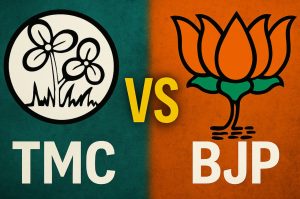Migrants from Bangladesh — The political landscape of West Bengal is witnessing yet another fierce debate — this time centering on the issue of migrants from Bangladesh and what it means for the cultural and political identity of the state. In the lead-up to key elections, both the ruling Trinamool Congress (TMC) led by Chief Minister Mamata Banerjee and the opposition Bharatiya Janata Party (BJP) have taken strong, often clashing stances on this long-standing and emotionally charged issue.
The Heart of the Debate: Who Defines Being Bengali?
Over the last few months, “Bengali identity” has become a political catchword. Mamata Banerjee, known for her firm stand on regional pride, has often emphasized that West Bengal welcomes those who embrace its language, culture, and way of life.
“Bengal belongs to those who love its culture, respect its people, and contribute to its society — regardless of religion or origin,” Mamata said during a recent public address.
In stark contrast, the BJP — led by top leaders like Sukanta Majumdar — has raised serious questions about illegal migration and demographic changes.
“West Bengal cannot become a shelter for illegal migrants,” said Majumdar in a recent rally. “Our people deserve priority — jobs, resources, and security.”
The Historical Context: Partition, Migration & Identity
The issue is rooted in history.
- After Partition in 1947, millions of people crossed borders between India and then-East Pakistan (now Bangladesh).
- The 1971 Bangladesh Liberation War triggered another large-scale refugee influx into West Bengal.
Ever since, different governments have faced the complex task of managing refugees who eventually settled and built their lives in the state.
Current Demographics and Political Significance
As per estimates, West Bengal shares a 2,216 km-long border with Bangladesh — one of the most porous international boundaries in India. This long border often sees illegal crossings, making migration a sensitive issue.
Both TMC and BJP recognize the electoral weight of Bengali-speaking voters who trace their roots to Bangladesh. The TMC accuses the BJP of using migration as a communal tool to divide people. The BJP counters that illegal migrants pose security and demographic threats.
More on international border policies can be read at:
→ https://www.mha.gov.in/ (Ministry of Home Affairs, Government of India)
Voices from the Ground: What Do the People Say?
Farmers and Laborers:
In villages like Bongaon and Basirhat, locals often speak of tight-knit communities built on common language and culture, regardless of where their grandparents hailed from.
“We work together, celebrate Durga Puja together,” said Kamal Ghosh, a local shopkeeper. “For us, being Bengali is about sharing joy and hardship alike.”
Refugee Families:
Meanwhile, refugee families who crossed over decades ago see this as a humanitarian issue.
“My parents came during 1971,” said Priya Biswas, a school teacher in Nadia. “West Bengal is my home. Our identity cannot be reduced to politics.”
The Political Crossfire: TMC vs BJP
In political circles, the fight intensifies as each party gears up for future state and national elections.
TMC’s Narrative:
Mamata Banerjee frames the debate as an attack on the very spirit of Bengal.
- Inclusive slogans like “Maa, Maati, Manush” (Mother, Earth, People) resonate across rural constituencies.
- The party routinely accuses the BJP of playing divisive politics under the garb of the NRC (National Register of Citizens) and CAA (Citizenship Amendment Act).
BJP’s Narrative:
The BJP emphasizes border security, legal migration, and jobs for locals.
- They say Mamata’s policies encourage illegal migration for political gain.
- They highlight the need for voter ID checks, biometric systems, and stricter border surveillance.
More on border security policies can be read at:
→ https://www.bsf.gov.in/ (Border Security Force)
Impact of the Debate on Society and Development
This heated rhetoric often trickles into everyday life — school admissions, healthcare access, and job opportunities. Many fear that heated political speeches can deepen divides and cause community tension.
“We need economic growth, not political blame games,” noted economist S. Bhattacharya. “Focusing only on who belongs here diverts attention from development and poverty reduction.”
What Do Experts Suggest?
Social scientists and civil society leaders advocate a balanced, data-driven approach:
Regularizing Migrants: Creating straightforward pathways for long-term residents to legalize status and contribute productively.
Cross-Border Cooperation: Strengthening diplomatic ties with Bangladesh for smoother cross-border movement and trade — while maintaining security.
Grassroots Dialogues: Encouraging cultural exchanges, sports, and local events to ease social tension and promote mutual respect.
Migrants from Bangladesh: The Road Ahead
The issue of migrants from Bangladesh in West Bengal is deeply intertwined with questions of identity, security, and political power. Both Mamata and the BJP will continue using the issue to mobilize their voter bases as elections approach.
Yet, as history reminds us, Bengal has always been a melting pot of different cultures. The challenge is ensuring that people, regardless of where they or their parents came from, can feel at home in this vibrant state — while ensuring that the legitimate concerns about security and resource allocation are also addressed.
Conclusion: Balancing Identity, Politics, and Progress
As West Bengal navigates this tense period, the choices its leaders make will shape not just the political discourse but also the future of its communities. Migrants from Bangladesh, long a part of the state’s social fabric, deserve dignified treatment — and the state’s residents deserve security and prosperity.
This is not a simple debate. It is one that tests the values of empathy, unity, and pragmatism. In the end, West Bengal must strive for a policy that reflects its rich legacy of cultural inclusion while looking to the future with a strong commitment to peace and progress.
Also read: Home | Channel 6 Network – Latest News, Breaking Updates: Politics, Business, Tech & More


